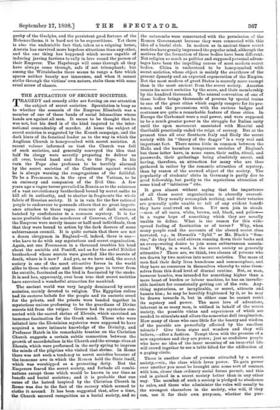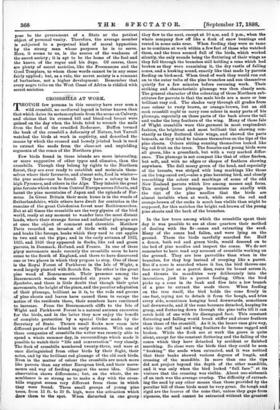THE ATTRACTION OF SECRET SOCIETIES.
TRAGEDY and comedy alike are forcing on our attention the subject of secret societies. Speculation is busy as to whether the assassin of the Empress Elisabeth was a member of one of those bands of social Ishmaelites whose hands are against all men. It seems to be thought that he was not, but his deed is of the kind imputed to the inter- national comradeship of murder. At home the subject of secret societies is suggested by the Kensit campaign, and the dark hints of its fanatical leader as to the way in which the Anglican Church is honeycombed with secret societies. A recent volume informed us that the Church was fall of such societies, and generally conveyed the idea that half its clergy were secretly preparing to deliver us all over, bound hand and foot, to the Pope. In his turn the Pope also professes to be terribly alarmed by the secret societies of the Continent against which he is always warning the congregations of the faithful. To be a Freemason is, in the eyes of the Vatican, to be an emissary and companion of the Evil One. A. few years ago a vague terror prevailed in Russia as to the existence of a vast revolutionary brotherhooa bound by secret oaths to kill all in authority, and to shatter in fragments the whole fabric of Russian society. It is in vain for the few rational people to endeavour to persuade others that no great import- ance attaches to these vague rumours of dark schemes hatched by confederates in a common mystery. It is far more probable that the murderers of Canovas, of Carnot, of the Empress were merely insane or half-mad individuals, than that they were bound to action by the dark decrees of some subterranean council. It is quite certain that there are not a dozen clergymen in England—if, indeed, there is one— who have to do with any mysterious and secret organisation. Again, not one Freemason in a thousand troubles his head about the amiable old Pontiff, and as for the awful Nihilist brotherhood whose secrets were guarded like the secrets of death, where is it now? And yet, as we have said, the secret society is one of the most attractive forces in the world alike to those who enter and those who gaze in terror from the outside, fascinated as the bird is fascinated by the snake. It is and has, apparently, ever been true that secret societies have exercised a wonderful attraction for mankind.
The ancient world was very largely dominated by secret societies, mainly devoted to religion. The Egyptian clans had its exoteric beliefs for the people and its esoteric creed for the priests, and the priests were banded together in mysterious anions professing to be the guardians of Divine secrets hid from the vulgar. Greece had its mysteries con- nected with the sacred shrine of Eleusis, which exercised an immense fascination for the Greek mind. Those who were initated into the Eleusinian mysteries were supposed to have acquired a more intimate knowledge of the Divinity, and Professor Hatch in his remarkable treatise on the Christian Church suggests a certain subtle connection between the growth of as,cerdotalism in the Church and the strange rites at Eleusis, which were performed in the early spring to impress the minds of the pilgrims who visited that shrine. In Rome there was not such a tendency to secret societies because of the immense awe in which the Roman held the State itself, which was worshipped as a protecting deity. But the Emperors feared the secret society, and forbade all combi- nations except those which would be known in our time as benefit and burial societies; and it is probable that one canoe of the hatred inspired by the Christian Church in Rome was due to the fact of the secrecy which seemed to clothe it around. It has been suggested that, after a time, the Church secured recognition as a burial society, and so
the catacombs were constructed with the permission of the Roman Government because they were connected with this
idea of a burial club. In modern as in ancient times secret societies have greatly impressed the popular mind, although thcP motives for the formation of these bodies have been aifferent- Not religion so much as politics and supposed personal advan- tages have been the impelling causes of most modern secret bodies. China is understood to be honeycombed with' secret societies, whose object is mainly the overthrow of the- present dynasty and an expected regeneration of the Empire.- But the most modern of great States is scarcely more exempt than is the most ancient from the secret society. America counts its secret societies by the score, and their membership by the hundred thousand. The annual convention of one of these bodies brings thousands of persona by special trains to one of the great cities which eagerly compete for its pre- sence, and the processions with the curious badges and costumes are quite a remarkable feature of these cities. In Europe the Carbonari were a real power, and were supposed to be a much greater power in the struggle for Italian unity until the open movement associated with Mazzini and Garibaldi practically ended the reign of secrecy. But at the present time all over Southern Italy and Sicily the secret society with its "theory of the dagger" is a very real and important fact. There seems little in common between the Mafia and the harmless temperance societies of England, but these latter have, in some cases, their oaths, ritual, and passwords, their gatherings being absolutely secret, and having, therefore, an attraction for many who are thus gathered in rather by the romantic attraction of mystery, than by reason of the avowed object of the society. The popularity of students' dribs in Germany is partly due to good fellowship, but partly to the mysterious attraction of some kind of " initiation " rite.
It goes almost without saying that the importance of all these secret organisations is absurdly overesti- mated. They usually accomplish nothing, and their votaries are generally quite unable to tell of any evident benefit they have conferred on them. Yet men join in shoals —men of all races, white, brown, red, black, and yellow— in. a vague hope of something which they are usually unable to define. What is the reason for this wide- spread feeling of fascination or of terror ? Why, when many people read the accounts of the absurd secret rites narrated, e.g., in Disraeli's " Sybil " or Mr. Black's "Sun- rise," do they feel cold shivers running down their backs and an overpowering desire to join some subterranean associa- tion? Why, in a word, is the secret society so generally attractive ? There are, we think, two classes of persons who are drawn by two motives into secret societies. The mass of men find their daily lives humdrum and commonplace, and.
they have no resources in themselves whereby to raise them- selves from this dead level of diurnal routine. But, as man, however humble, was intended for something higher than a mere beast of burden or labour machine, he has an ineradic- able instinct for occasionally getting out of the rats. Any-
thing mysterious, or inexplicable, or secret, attracts and haunts him; he may be horribly frightened by it, or he may be drawn towards it, but in either case he cannot resist .
its mystery and power. The mere love of adventure, inherent in so many men, is utilised in behalf of the secret society, the possible vistas and experiences of which are needed to stimulate and allure the somewhat dull imagination. How many of those who care little for the beauty and wisdom of the parable are powerfully affected by the smallest miracle ? Give them signs and wonders and they will believe,—after a fashion. Tempt them with the promise of a. new experience and they are yours ; just as credulous people who have no idea of the inner meaning of an immortal life - will crowd together to see a table tilted for the edification of a gaping circle.
There is another class of persons attracted by a secret society,—viz., the class which loves power. To gain power over another you must be brought into some sort of contact.
with him, closer than ordinary social forms permit, and this. end is gained in a secret society better than in any other way. The member) of such a society is pledged to obedience to rules, and those who administer the rules will usually be the strongest characters in the society, who will, if they can, use it for their own purposes, whether the pur- pose be the government of a State or the pettiest object of personal vanity. Therefore, the average member is subjected to a perpetual kind of moral hypnotism by the strong man whose purposes he is to serve. Here, it seems to us, is the source of the weakness of the secret society ; it is apt to be the home of the fool and the knave, of the rogue and his dupe. Of course, there are plenty of secret societies, like the Freemasons and the Good Templars, to whom these words cannot be in any sense fairly applied ; but, as a rule, the secret society is a remnant of barbarism, not a higher development. Remember that every negro tribe on the West Coast of Africa is riddled with secret societies.



































 Previous page
Previous page